Bleeding Gums and Chinese Medicine
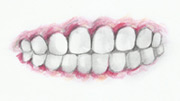 Bleeding gums
Bleeding gums
- Poor oral hygiene habits such as improper blushing, tooth picking or unfitted dentures;
- Hormonal changes such as during pregnancy, menstruation, puberty or menopause;
- Diseases that affect the immune or blood clotting system, such as leukemia, diabetes, mouth sores, liver or kidney dysfunctions;
- Medications such as blood thinner, anticonvulsant, or chemotherapy drugs;
- Nutritional deficiency such as vitamin C or K deficiency;
- Bad habits such as smoking.
- Gums that bleed during and after brushing teeth
- Red, swollen or sore gums
- Bad breath or bad taste in the mouth
- Sensitive teeth
- Receding gums
- Formation of deep pockets between the teeth and gums
- Loose or shifting teeth
Regardless of the cause, good oral hygiene is fundamental for healthy gums. It is necessary to choose a soft bristle toothbrush, brush the teeth gently, and visit the dentist every 6 to 12 months for plaque removal. In case if the bleeding is severe, or accompanied with other unexplained symptoms, you should consult a doctor.
Traditional Chinese medicine (TCM) can work with modern dentistry to promote gum health.
In TCM theory, the mouth is connected to the rest of the body. Teeth are considered to be remnants of bone and are nourished by kidney essence. The stomach and large intestine meridians pass through the upper and lower tooth beds respectively and supple the blood and qi (vital energy) to the regions. Tooth and gum conditions can reflect the functional states of the kidneys, the stomach or the large intestine. Physicians focus on the internal disharmonies that involve these three organs rather than applying local treatment for tooth and gum problems. In case of bleeding gums, the pathology is either due to excessive fire and heat or inadequate qi; the former forces blood flowing out of the normal pathways and the later makes the gums unable to retain the blood within the vessels. Physicians will look for the gum conditions, accompanying signs, pulse and tongue signs when deciding appropriate remedies. Common disharmony patterns that involve bleeding gums are as below.
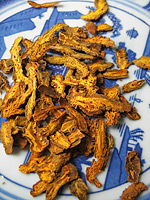 golden thread rhizome golden thread rhizome |
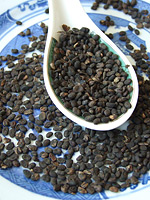 psoralea psoralea |
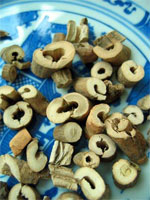 peony root bark peony root bark |
Herbal prescriptions for bleeding gums
Heat in stomach and intestines
The bleeding is heavy and bright red in color, other symptoms may include swollen and sore gums, thirst that prefers cold drinks, bad breath, constipation, and yellow urine. A red tongue covered by yellow and thick coating, the pulse is surge and rapid. The remedy should aim to clear stomach and purging fire.
Sample prescription: Clear Stomach Powder plus honeysuckle flower and dandelion
Virtual fire in stomach
A mild gum bleeding, accompanied with swollen, pocket formation or recession of the gums, and mild toothache. There may also be thirst, mouth dryness, a red tongue without coating, and the pulse is 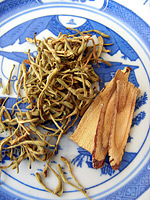 Honeysuckle flower and
Honeysuckle flower and
liquorice root
- Humifuse euphorbia herb (di jin cao, 12g), wolfberry root-bark (15g) and rehmannia root (15g);
- Common scouring rush herb (mu zei, 30g); and yerbadetajo herb (60g);
- Psoralea (30g);
- Gypsum (30g), Amur corktree bark (15g), gallnet of Chinese sumac (15g) and black catechu (6g);
- Honeysuckle flower (15g) and liquorice root (15g);
- Manchurian wildginger (3g), Sichuan pepper (10g) and bugbane rhizome (10g).
Home care advice for bleeding gums
Prevention is better than cure. Your life habits and diet have an enormous effect on the overall condition of your gums. It is advised to maintain a balanced lifestyle with ample sleep, adequate nutrition and regular exercise. Healthy oral hygiene habits include:- Drink water after eating to wash away the food residue and make it less likely to buildup plaque on the teeth.
- Quit smoking and eliminate snacks between meals, since these are common risk factors for the development of gum disease.
- Reduce stress, a stressful body results in fluctuated hormonal levels and thus increase sensitivity of the gums.
- Eat plenty of fresh vegetables and fruits.
- A simple and bland diet. Over consumption of alcohol and foods that are heavily spicy, greasy and hard not only damage the gums directly, they also bring about heat pathogens which accumulate in the stomach and intestines. The heat pathogens will then irritate the gums through the meridians.


